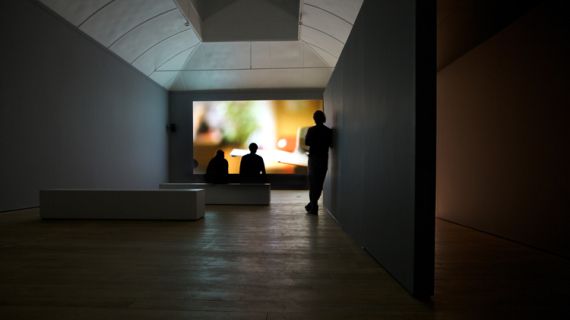
Installed at Newlyn Art Gallery. Photographer Steve Tanner
Single Channel Video, 10 minutes, 45 seconds, 2009
In a playful echo of Darwin’s publication 'The Expression of Emotions in Man and Animals', Follow the Voice establishes striking parallels between a range of familiar man-made sounds and an equally evocative chorus of animal cries and calls. Chasing (and carefully recording) pockets of sound around the contemporary urban landscape of Shrewsbury, Marcus Coates uncovers and explores unexpected patterns of sonic kinship.
Isolating a number of sounds from the continuous hubbub of everyday background noise, including the ‘beep’ of the supermarket checkout, the siren of a police car and the noises of a school playground, Coates subjects the audio components of each video sequence to varying levels of manipulation (speeding them up or slowing them down to alter their pitch). As if tuning in to the right wavelength on this sonic sliding scale, he then adds to the mix by introducing field recordings of animals and birds whose songs and cries are uncannily identical to his newly-dislocated, disembodied sounds. Highlighting the rising-and-falling, one and two-note structure of primitive calls expressing recognition or alarm that are common across disparate species, Follow the Voice captures the heightened feeling of interconnectedness at the heart of Darwin’s view of the world, while reminding us of the spirit of curiosity and discovery that infuses Darwin’s ideas.
Alongside an exhibition presentation at the Unitarian Church in Darwin’s birthplace of Shrewsbury, Coates’ work also accompanied Opera North’s production The Weatherman throughout July 2009 at Theatre Severn in Shrewsbury (as part of the Shift Time Festival), and then at The Sage in Gateshead and Howard Assembly Rooms in Leeds.
In his new essay In Unison, Steven Bode tunes into the lingering resonances of Marcus Coates’ work, and how its ecological message reverberates in the present.
Follow the Voice was presented at Canary Wharf Screen as part of The City in the City programme between 1 March and 27 May 2012.

Exhibition Dates
Unitarian Church, Shrewsbury
11 July – 8 August 2009
Opera North tour (Various UK venues)
11–18 July 2009
Newlyn Art Gallery, Penzance
21 November 2009 – 30 January 2010
Follow the Voice was co-commissioned by Film and Video Umbrella with Shropshire Museums Services and funded by Arts Council England.